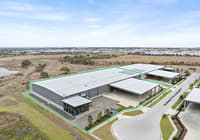
Batteries to power up warehouse pipeline as big as 40 MCGs
Dexus will install more than $25 million worth of batteries in new warehouses, equal to the size of 40 Melbourne Cricket Grounds, as it looks to future-proof its investment portfolio and help its customers reduce their energy costs and carbon footprints.
The installation of a $500,000 to $700,000 commercial grade base battery system (connected to rooftop solar) on all new warehouses is expected to deliver total annual energy savings of more than $4.6 million once more than 1 million square metres of industrial space is delivered over the next few years.
The battery program will remove about 27,450 tonnes of carbon emissions from the atmosphere every year, the equivalent of removing about 6500 petrol-powered cars from Australia’s roads.

Energy stored in batteries will be particularly useful to companies running 24-hour operations because it will supplement power supply overnight.
Dexus head of industrial transactions and development Chris Mackenzie said it was no longer hard to convince its tenant customers to invest a little deeper in renewable energy compared with just five years ago.
“A few years ago, four out of 10 of our tenants were interested in this. That’s increased significantly to now nine out of 10 showing interest,” Mr Mackenzie told The Australian Financial Review.
The growing focus on environmental, social and governance (ESG) policies, the push to achieve net zero and the significant increase in power costs had put batteries “front of mind” of many tenant customers, he said.
“Our tenants are focusing on operating costs, not just rents,” Mr Mackenzie said.
ESG and sustainability were also major focus points for Dexus’ investor partners, he added.
Installing a 200-kilowatt-hour (kwh) battery in the base build of a new 20,000 sq m warehouse is expected to cut energy costs by an average of $4.60 per square metre or $92,000 a year while reducing carbon emissions by 549 tonnes per year, Dexus has calculated.
Tenants relocating from an older warehouse into a battery-enabled one could see reductions in their energy bill of between 50 and 80 per cent.
Mr Mackenzie said including a base battery system in all new warehouses could set a standard for industrial property developers across the sector.
“[It’s] one we hope the rest of the industry will follow,” he said,
In some cases, Dexus will fund the cost of the installation of batteries and include that facility in the rent a tenant pays, while in others it will partner with the occupier on the installation of the battery.
The first tranche of this new battery and solar infrastructure will be four industrial projects at Dexus’ Horizon 3023 estate in Ravenhall in Melbourne’s west. The first of these next-generation warehouses is expected to be completed by late 2024.
The 127-hectare estate, about 20 km from the Melbourne CBD, will be home to 550,000 square metres of logistics and warehousing facilities. Occupiers that have pre-committed to the estate include Amazon, Hello Fresh, Electrolux, Mitre 10, eStore and Myer.
The investment in battery power by Dexus follows a report last year by commercial agents JLL which forecast significant leasing “churn” over the coming years as major occupiers seek premises that will help them achieve net zero carbon emission targets.
Nine companies, including Bunnings, Kmart, Symbion, Super Retail Group and Linfox, with combined leases of close to 1.3 million sq m of warehouse space, aim to be carbon-neutral by 2030, JLL found
Of this 1.3 million sq m of warehouse space, more than 90 per cent is occupied on leases set to expire before 2030.
“If [these companies] are not in a building that fits in with their net zero targets, they will have to do something about it,” said Annabel McFarlane, JLL’s Australian head of strategic research,
Mr Mackenzie said Dexus’s battery program would create a point of difference among tenant occupiers.
“It will be nice to see their shock when their energy bill arrives – and they can put those savings back into their operations,” he said.











